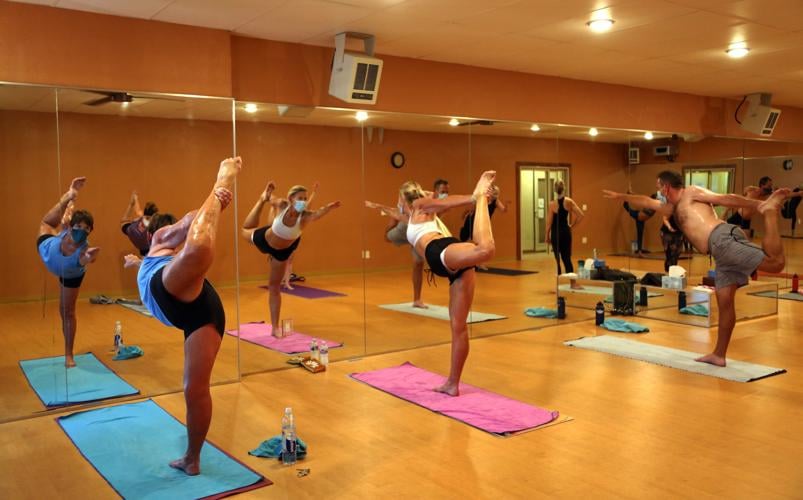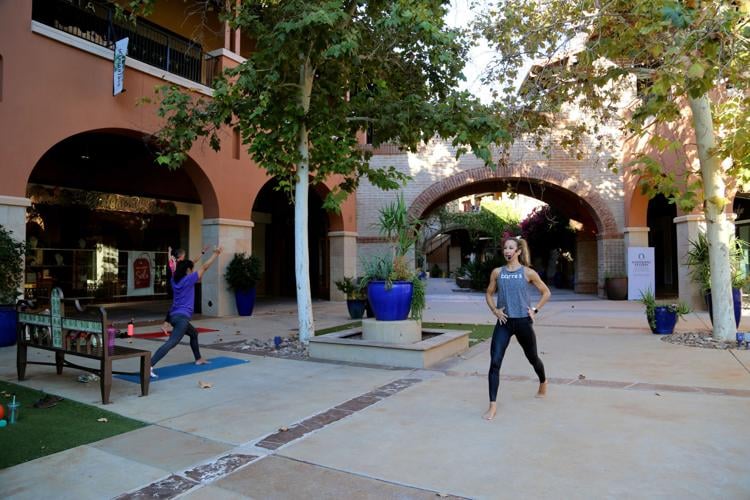Small fitness businesses around Tucson are struggling to survive while operating under strict COVID-19 mitigation strategies.
In Arizona, small fitness studios have been subjected to two separate shutdowns since the coronavirus pandemic struck in March. Several well-known studios, like Yoga Vida and Hot Yoga Tucson, have been forced to close their doors forever. Many have reopened, but COVID-19 restrictions have dramatically altered business operations.
“We are down about 70% of what we normally are because of all the restrictions,” said Chelsea Lucas, owner of Session Yoga. “So that should tell you that things are kind of rough.”
To remain open, small fitness studios have to abide by requirements put into place by the Arizona Department of Health Services. Requirements include reducing occupancy to 25%, mandating the use of masks for all guests while indoors, the enforcement of physical distancing rules, and rigorous cleaning protocols.
Gyms and fitness studios in Arizona are required to operate at 25% capacity as long as the rate of community transmission of the virus is considered moderate — below 100 cases per 100,000 residents. In Pima County, the number of COVID-19 cases has fallen, but it is still well above the level that would allow fitness businesses to increase capacity.
Some studio owners do not know how long their businesses can survive with COVID-19 mitigation strategies in place. With class size limitations, owners are struggling to turn a profit. Rent and other operating costs have remained the same, but potential income has been reduced drastically.
“We are losing money. At present, we are losing money,” said Shannon VanDeusen, the owner of Sumits Yoga Tucson, 4951 E. Grant Road. “We lose more money being open than being forced to be closed.”
Kate Ares, the owner of Barre3 Tucson, has been struggling to break even since she reopened her studio doors in May.
Ares has owned Barre3 Tucson, a boutique fitness studio that specializes in strength conditioning and mindfulness, for over six years. In the past, Ares was able to offer back-to-back classes every day and fill each class with up to 32 people. Now, she is only able to offer one to two indoor classes per day to allow for adequate time to clean between classes. Each indoor class can only have up to six people due to the capacity limitations
In addition to in-studio classes, Barre3, at 2905 E. Skyline Drive, is offering outdoor classes at La Encantada and online classes to keep clients engaged.
“I think people are all over the board on what they’re comfortable with. You do see people that are going and taking classes, but there’s a large chunk of people who are still not comfortable, and I think it’s going to be like this for a while,” Ares said.
Between their in-studio, outdoor, and online class offerings, Barre3 Tucson was able to turn a profit in September for the first time since May. But Ares still worries about the long-term viability of her business as the pandemic continues to pose a threat to the community.
“My goal is to survive this. I love my business. I love what I do, and I want to be here when this is over,” Ares said.
MAKING IT WORK
Concerned about whether their businesses can survive under the current capacity limitations, some owners have turned to outdoor classes, which are not limited by ADHS requirements as long as physical distancing is possible.
Soleil Chiquette, the owner of Let’s Sweat, opted to offer only outdoor classes after the second COVID-19 shutdown inhibited gyms and studios from operating in June.
Chiquette knew her customers weren’t comfortable being back inside, so she decided to offer spin and strength classes out on the Let’s Sweat patio, 439 N. Sixth Ave., and at Catalina Park instead. Let’s Sweat’s outdoor classes are popular among their clients, and they have allowed Chiquette to stay above water.
The same can be said for Lucas, the owner of Session Yoga. Lucas owns two studios at 123 S. Eastbourne Ave. and 1135 N. Jefferson Ave. One of her spaces is a strictly indoor studio that offers hot yoga classes, and the other has both indoor and outdoor options.
Lucas has been able to consistently offer outdoor classes, which has helped her keep her studios afloat.
“Luckily, I was able to continue with the outdoor yoga, so that sustained us from not closing permanently. Without that, I don’t think we would have made it,” Lucas said.
Some studio owners have been unable to transition to outdoor classes because they rely on an indoor environment to create a specific atmosphere.
At Tucson Yoga Sol, a hot yoga studio in northwest Tucson, this is the case. Instructors manipulate heaters to facilitate Bikram yoga and hot Pilates classes. The owner, Diane Van Maren, is unsure if she will be able to keep her business up and running if the current restrictions remain in place.
“I would say that our income is somewhere between 30 and 40% of what it was,” Van Maren said. “The reality is, we are not 100% sure whether the studio can survive these kinds of mandates. I think we can do it for a short period of time, but if it starts to extend into next summer for instance, I think it would be pretty difficult for us to work with these kinds of restrictions and turn a profit.”
THE BOTTOM LINE
Van Maren can only allow 12 people to practice at a time and has also limited the number of classes she offers per day to allow time for adequate cleaning between classes. She requires that students maintain physical distance and wear a face covering while working out.
Tucson Yoga Sol is one of the local fitness studios that is following the ADHS requirements to a T, but not all studios are abiding by the same standards. Some studios do not require students to wear masks while they practice, which doesn’t make for a level playing field, according to Van Maren.
At Yoga Pod Tucson, a new studio in St. Philip’s Plaza, owned by Lisa Cutts, they define capacity based on the size of the room where people practice. Because of a hospital-grade air filtration system, students are not required to wear masks while on their mats, which are spaced 6 to 7 feet apart. Cutts feels that her COVID-19 protocols are responsible and says that her top priority is keeping people safe.
Despite the financial strain, VanDeusen of Sumits Yoga Tucson says the focus must remain on health.
“We are in the business of health and wellness. Packing more people in for an extra 12 bucks a class is not worth the gamble for me, and it’s really contrary to what we’ve set out to do as yoga studio owners,” said VanDeusen. “We do have an obligation. We have a legal obligation. We have a moral obligation, to follow whatever protocols that we think are going to keep people the safest.”





